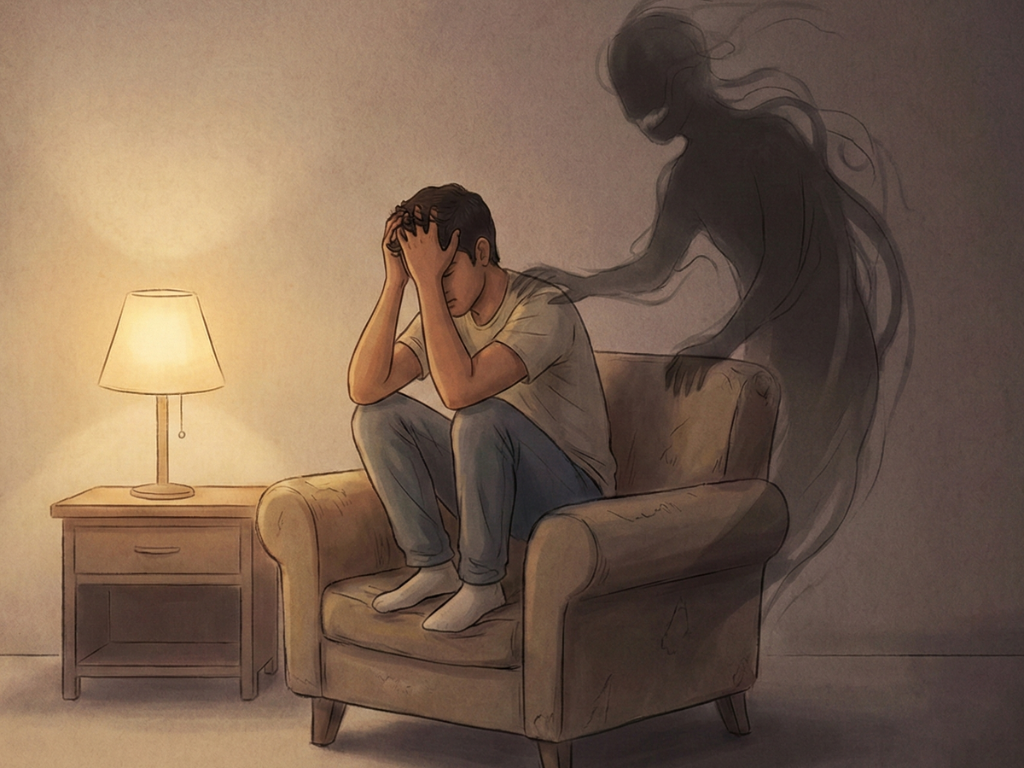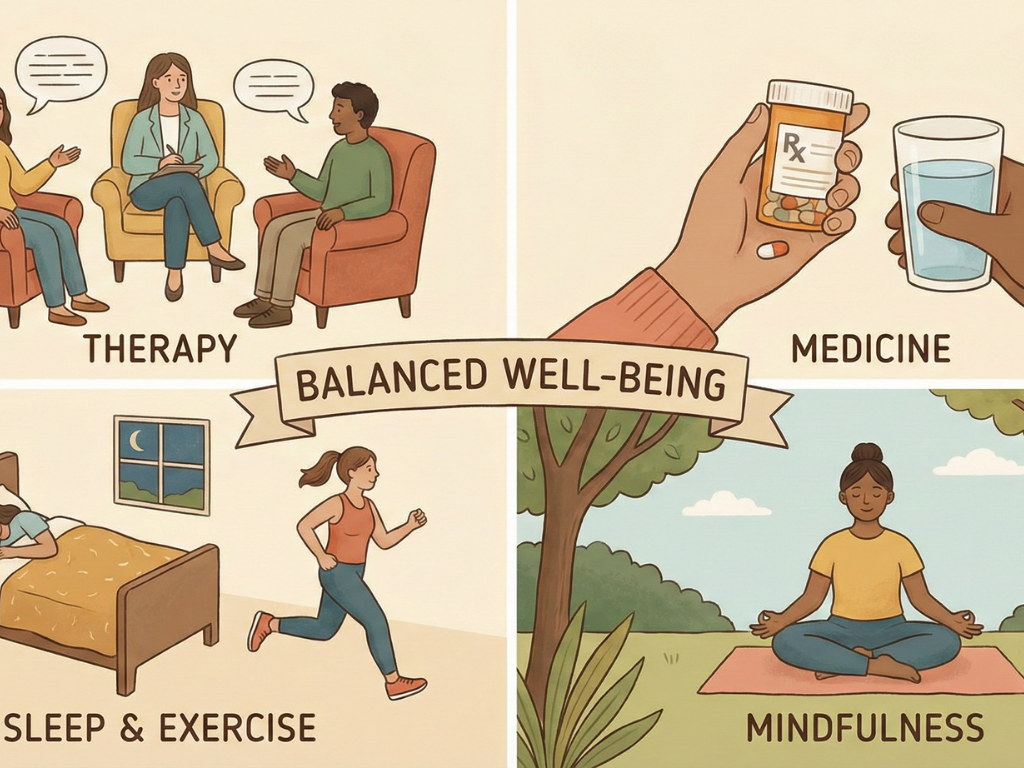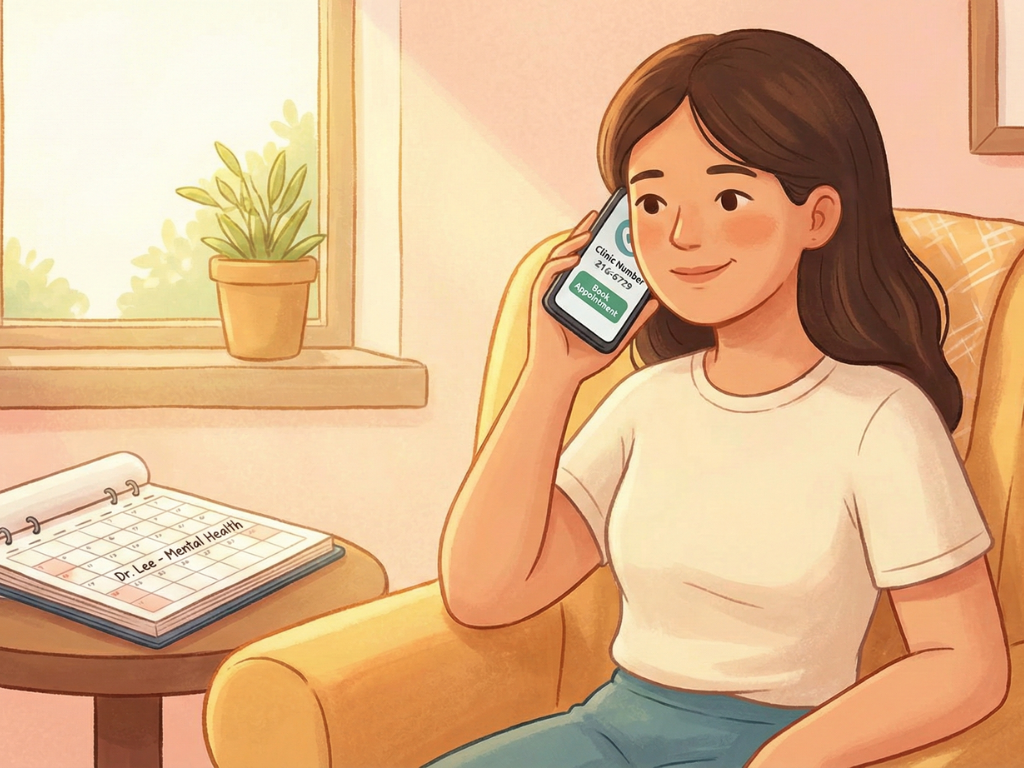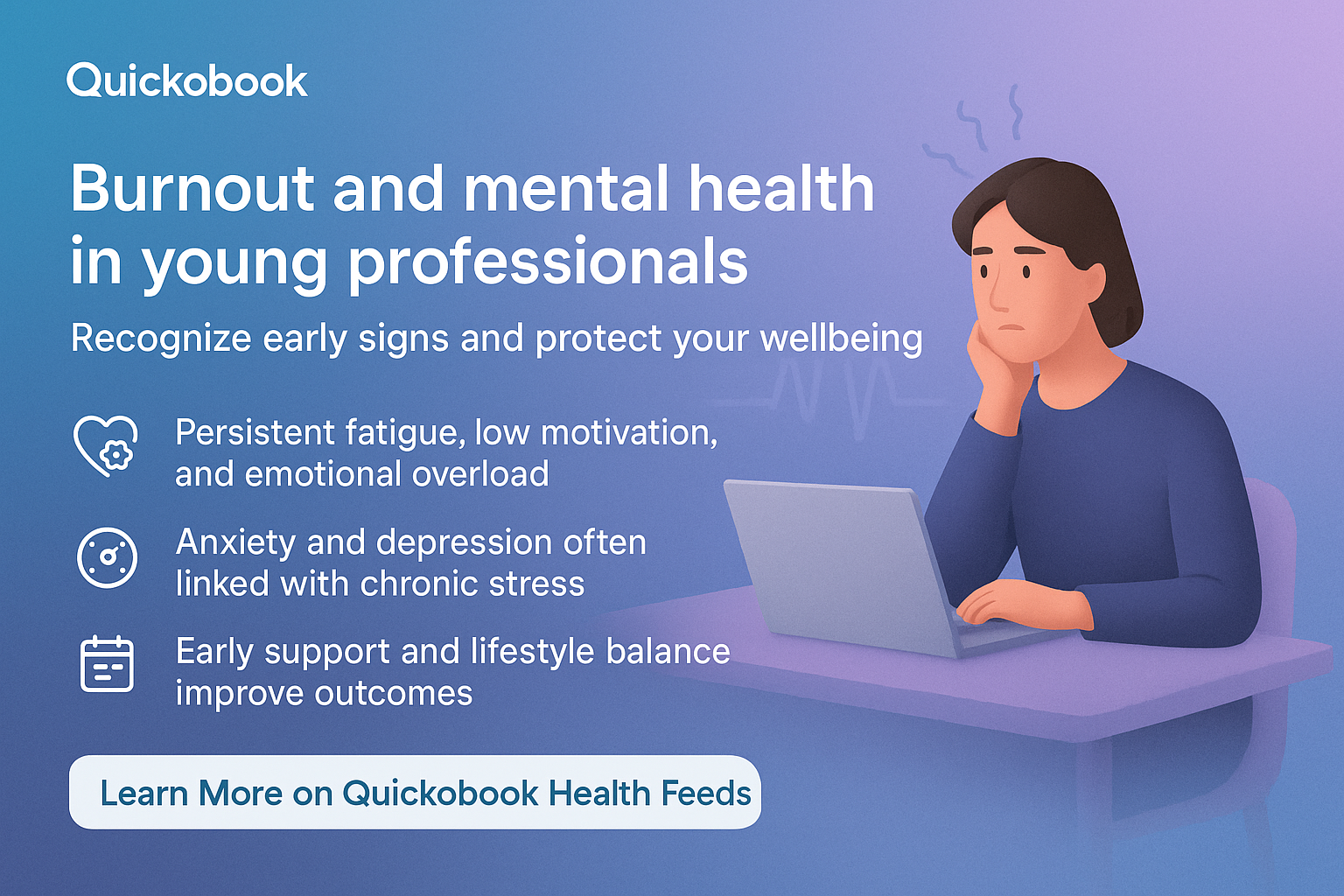Introduction
Depression is becoming more common among India’s young population, especially Gen-Z and working professionals. Life today is fast, competitive, and constantly connected through screens. Students face academic pressure, job worries, and fear of failure. Employees face long work hours, deadlines, workplace stress, and burnout. Many also compare their lives to social media, which can lead to low confidence and anxiety.
Depression and anxiety are medical conditions, not weaknesses. With the right support, treatment, and lifestyle changes, people recover and live healthy lives. This blog explains these issues in simple language so you can understand symptoms, seek help early, and support your loved ones.

What Is Depression?
Depression is a long-lasting medical condition where a person feels sad, empty, tired, or hopeless for more than two weeks. It affects daily life—sleep, eating habits, studies, job performance, relationships, and motivation.
It is different from normal sadness. Sadness improves with time, but depression stays longer and makes it hard to function.
Common Signs of Depression
-
Persistent sadness or low mood
-
Loss of interest in usual activities
-
Feeling tired even after rest
-
Difficulty sleeping or oversleeping
-
Lack of concentration
-
Feeling worthless or guilty
-
Changes in appetite
-
Headaches, body pain, or stomach issues with no clear cause
-
Thoughts of self-harm (immediate medical help required)
What Is Anxiety?
Anxiety is constant worry, fear, or nervousness. It feels like the mind is “always on alert.” This is different from normal stress. In anxiety, the fear continues even when there is no danger.
Common signs of anxiety:
-
Overthinking and constant worry
-
Fast heartbeat or chest tightness
-
Sweating or shaking
-
Trouble focusing
-
Fear of social situations
-
Feeling restless or “on edge”
-
Trouble sleeping
-
Stomach discomfort or nausea
What Is Burnout?
Burnout is extreme physical, emotional, and mental exhaustion caused by long-term stress, especially at work or college. It makes people feel drained, irritated, or detached.
Signs of burnout:
-
Constant tiredness
-
Feeling less productive
-
Losing motivation
-
Irritability
-
Feeling disconnected from work or studies
-
Reduced performance
Why Are Gen-Z and Working Professionals More Affected?
-
Long screen hours
-
Academic and job competition
-
Social media pressure
-
Lack of work-life balance
-
Expectations from family
-
Financial stress
-
Job instability
-
Loneliness despite being online
-
Irregular sleep cycles
-
Poor dietary habits
-
Limited physical activity
Gen-Z mental health is more vulnerable because many young people feel isolated, misunderstood, overwhelmed, or unsure about their future.
Causes of Depression, Anxiety & Burnout
-
Chemical imbalance in the brain
-
Hormonal changes
-
Stressful relationships
-
Workload and unrealistic deadlines
-
Bullying or harassment
-
Social isolation
-
Chronic illness
-
Excessive social media use
-
Lack of support system
-
Comparing achievements with peers
-
Sleep disorders
No single cause is responsible; it usually results from a combination of biological, emotional, and environmental factors.
How These Conditions Affect Daily Life
-
Poor performance at school or work
-
Frequent absenteeism
-
Low energy
-
Difficulty making decisions
-
Losing interest in hobbies
-
Relationship conflicts
-
Reduced productivity
-
Increased mistakes at work
-
Withdrawal from friends or family
-
Missed deadlines
-
Low confidence
ALSO READ: Functional Foods & Immunity Boosters
Diagnosis: How Doctors Identify Depression and Anxiety
A mental health professional evaluates:
-
Mood changes
-
Sleep patterns
-
Thoughts and behaviour
-
Daily functioning
-
Medical history
-
Stress levels
Sometimes blood tests are done to rule out thyroid issues, vitamin deficiencies, or other physical illnesses that may mimic depression symptoms.

Treatment Options
Treatment depends on the severity of symptoms. A doctor or psychiatrist decides the best plan.
1. Counselling/Therapy
-
Helps understand emotions
-
Teaches coping skills
-
Builds confidence
-
Improves decision-making
Types: Cognitive Behavioural Therapy (CBT), talk therapy, stress management therapy.
2. Medication
Antidepressants or anti-anxiety medicines may be given.
Dosage should only be decided by a doctor.
3. Lifestyle Changes
-
Regular sleep
-
Reduced screen time
-
Exercise
-
Spending time with supportive people
4. Combining therapy + medication
This is often the most effective approach for moderate to severe depression.
Lifestyle Tips for Gen-Z and Working Professionals
-
Follow a sleep routine
-
Exercise 20–30 minutes daily
-
Reduce late-night screen use
-
Limit caffeine
-
Take breaks during work
-
Avoid comparing life to social media
-
Spend time outdoors
-
Practice journaling
-
Set healthy boundaries
-
Plan your day to avoid burnout
How to Prevent Burnout & Depression
-
Take short breaks between tasks
-
Avoid overworking
-
Prioritize mental rest
-
Engage in hobbies
-
Talk to trusted friends or family
-
Seek therapy early
-
Maintain healthy workplace boundaries
-
Practice breathing exercises
-
Avoid multitasking overload
When to See a Doctor

Seek medical help if you notice:
-
Symptoms lasting more than 2 weeks
-
Difficulty sleeping or eating
-
Feeling hopeless or withdrawn
-
Panic attacks
-
Trouble concentrating
-
Thoughts of self-harm (emergency help required)
Early treatment leads to better and faster recovery.
Risks of Ignoring Symptoms
-
Worsening depression
-
Social withdrawal
-
High stress levels
-
Impact on studies or career
-
Relationship issues
-
Substance use
-
Increased physical health problems
-
Severe anxiety attacks
50 FAQs (Short Answers,)
-
What is depression?
Depression is a long-lasting low mood that affects daily life and functioning. -
Can Gen-Z experience depression?
Yes, Gen-Z mental health issues are increasing due to study pressure, social media, and stress. -
Is anxiety the same as stress?
No, anxiety continues even when the stress trigger is gone. -
What is burnout?
Burnout is emotional and physical exhaustion from long-term pressure. -
Can social media cause depression?
Excessive comparison and negativity can increase sadness and low self-esteem. -
Is depression treatable?
Yes, with therapy, lifestyle changes, and sometimes medication. -
Is counselling helpful?
Counselling helps understand emotions and develop coping skills. -
Do antidepressants work?
Yes, but only under a doctor’s supervision. -
Can anxiety cause physical symptoms?
Yes, like sweating, shaking, stomach pain, and fast heartbeat. -
Can lack of sleep worsen mental health?
Yes, poor sleep increases stress and low mood. -
Is depression common in India?
Yes, millions of young people experience depression or anxiety. -
Can workload cause burnout?
Yes, heavy deadlines and long hours trigger burnout. -
Can depression affect studies?
Yes, it reduces focus, memory, and motivation. -
What is a panic attack?
A sudden rush of fear with fast heartbeat and breathlessness. -
Can exercise reduce depression?
Yes, it improves mood and reduces stress hormones. -
Does screen time affect mental health?
Too much screen time can increase anxiety and sleep issues. -
Is depression genetic?
Genes may play a role, but environment also matters. -
Can anxiety be cured?
With treatment, many people manage or recover fully. -
Can burnout cause depression?
Yes, long-term burnout can lead to depression. -
Do students face depression?
Yes, exam pressure and competition often contribute. -
Can diet affect mood?
Healthy food supports brain functioning and mood. -
Is therapy confidential?
Yes, trained therapists maintain privacy. -
Can you have both depression and anxiety?
Yes, they often occur together. -
Does meditation help?
Meditation reduces stress and improves focus. -
Is crying a sign of depression?
Not always, but frequent crying may indicate emotional distress. -
Can relationships cause stress?
Yes, toxic relationships can worsen mental health. -
Is it okay to take a break from work?
Yes, breaks help prevent burnout. -
Can financial stress cause depression?
Yes, money worries are a major trigger. -
Are mental illnesses permanent?
No, most are treatable with proper care. -
Can loneliness cause depression?
Yes, lack of support increases sadness. -
Does sunlight help mood?
Yes, sunlight boosts vitamin D and improves mood. -
Is depression a sign of weakness?
No, it is a medical condition. -
Can burnout affect physical health?
Yes, it can cause headaches and fatigue. -
Do young adults need therapy?
They can benefit greatly from emotional support. -
Can depression return?
It may return without proper care and lifestyle balance. -
Is self-diagnosis safe?
No, always consult a professional. -
Can anxiety affect work?
Yes, it reduces productivity and focus. -
Can depression cause anger?
Yes, some people feel irritability instead of sadness. -
Does caffeine worsen anxiety?
Too much caffeine can increase restlessness. -
Is journaling helpful?
Yes, writing reduces stress and clears thoughts. -
Can depression affect appetite?
Yes, appetite may increase or decrease. -
Can burnout happen to students?
Yes, study pressure can cause severe exhaustion. -
Is it okay to ask for help?
Absolutely, early help leads to healing. -
Can pets improve mood?
Yes, pets provide comfort and reduce stress. -
Does routine help mental health?
Yes, a stable routine improves balance. -
Is work-life balance important?
Yes, it protects mental and physical health. -
Can depression in Gen-Z be prevented?
Healthy habits and support can reduce risk. -
Do phones affect sleep?
Yes, screens delay sleep and increase anxiety. -
Can therapy be online?
Yes, teleconsultation is safe and effective. -
When should I see a doctor?
If symptoms last more than 2 weeks or affect daily life, consult a professional.
Conclusion
Depression, anxiety, and burnout are rising in India, especially among Gen-Z and working professionals. But these conditions are treatable. With early understanding, therapy, lifestyle care, and supportive relationships, recovery is possible. Mental health is just as important as physical health, and seeking help is a sign of strength.
Quickobook CTA
If you or someone you know is struggling with depression or anxiety, you can easily book a trusted psychiatrist, psychologist, or general physician through QuickoBook.
Verified doctors
Online or in-clinic appointments
Affordable options
Safe and private consultations
Take the first step toward better mental health today.
Disclaimer
This blog is for educational purposes only. It does not replace medical advice, diagnosis, or treatment. Always consult a qualified doctor for personal medical concerns.









Comments (0)
No comments yet. Be the first to share your thoughts!
Leave a Comment